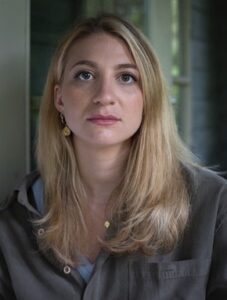The truth about lies
by Bea Setton
“Scintillating… Berlin is wonderfully funny, and Daphne’s observations about modern life, men and the challenges facing young women always hit the nail.” Suzi Feay, Financial Times
My novel Berlin features a so-called unreliable narrator. Daphne misleads the reader, lies to others and to herself. Early readers have pegged her as a toxic compulsive liar. But I don’t think she is exceptionally unreliable. Instead, I believe fictional characters and real people tend to exaggerate the extent to which they are honest with others and themselves.
I find life is punctuated by systematic lying. Now ‘lying’ is a strong word. It is not one we would like to apply to our friends, loved ones, colleagues, still less to ourselves. But we all do it. All the time. Few people admit it to others; few admit it to themselves.
Anyone who has social media will be familiar with the impulse to romanticise or to make life seem better than it really is. I post flattering pictures, delete ugly ones. I announce book deals, and don’t mention the long list of agents and editors who rejected me. This is very common behaviour. We want to convince others and ourselves that we are living the good life. But making oneself seem happier, more successful, more beloved, more beautiful; is this not a kind of lying?
Perhaps these are not lies but curations of the truth, and it may be argued that social media exists to offer us a fantasy version of reality. But there are less ambiguous examples of lying that many of us indulge in. We lie to friends and lovers all the time. Yum, that apple crumble was delicious! And yes Chad, you’re the best-looking man I’ve ever been with.
Perhaps these are only harmless white lies; we don’t want to hurt others around us. But even well-intentioned lies often have serious consequences. People suffering from addiction will often deny that they have relapsed; my narrator Daphne has an eating disorder and reassures others around her that yes, she’s already eaten breakfast, thank you very much. My cousin would lie to her parents and tell them she’d made friends at school because she wanted them to think she was popular. We don’t want people to worry; we tell them what they want to hear.
And then there are the lies we tell that are a little more devious, a little more manipulative. Not all lies are told to protect our loved ones from a hard-to-hear truth; we often say things to make ourselves look better than we really are. When I lived in Berlin, I had the privilege of meeting the great moral philosopher Martha Nussbaum. She asked where I worked. I was at the time unemployed and I didn’t want to admit that I’d been rejected from every graduate school I applied for. So I told her I was doing a PhD at Oxford with the brilliant feminist philosopher Amia Srinivasan. I lied because I wanted someone I admired to think that I was intelligent and that I had a promising future. This isn’t good behaviour; but it isn’t remarkable. My mother pretended she had a degree to get her first job. People very often lie to hide the extent of their privilege; because who wants to admit that they’ve had it easy, that they started life with a leg up? I have friends who lie about the fact that they are struggling with money, and others who lie about the fact that they are very wealthy. People lie to their employers about how hard they’ve been working. Is this pathological? Or is this quite ordinary?
Most often when people lie, they are trying to convince themselves as much as they are trying to persuade others. Think of your friends. Think of yourself…”
We tell lies to be more interesting. One friend of mine pretended to be an orphan. Another pretended that she was pregnant and let us accompany her to an emergency clinic. A childhood friend pretended that his father was a pilot in the air force who also ran a zoo and owned many lions, and that was why he was never at parent-teacher meetings, never present for his birthdays. He wasn’t absent and neglectful. He was saving elephants with his aeroplane!
Most often when people lie, they are trying to convince themselves as much as they are trying to persuade others. Think of your friends. Surely one of them at least has a problem with alcohol, disordered eating, with working far too hard or far too little, with dating horrible people or with mistreating their partners. These people are often deeply in denial about what they are doing. Think of yourself. Can you truly admit that you’ve never stalked your ex-boyfriend’s new boyfriend, or your new girlfriend’s ex-boyfriend? Many of us indulge in these secretive covert behaviours. We never confess unless we are caught red-handed.
It is difficult to be honest with yourself about your own bad behaviour. Most people, I suspect, go around thinking of themselves as good people. This is despite the evidence that people do awful things. Think of sexual harassment, assault, stalking, racism, sexism, bigotry; then think of the everyday ‘legal’ things like wealthy white people moving to ‘cool’ neighbourhoods despite their stated concern for gentrification; people cheating on their partners, the way we treat animals as a society, how we buy things wrapped in wads of plastic and dispose of them without a second thought. These are small acts of evil that are extremely commonplace. Yet people who do these things think that they are good. They are lying to themselves. We all lie to ourselves.
 Bea Setton was born in France and spent her early years in the Parisian suburbs before moving to the USA to study Philosophy. Upon graduating, she relocated to Berlin, and the city became the inspiration for her debut novel. She currently divides her time between London and Cambridge, where she is studying for a PhD in the Anthropology of Religion, and working on plans for her second book. Berlin is published in hardback, eBook and audio download by Doubleday and Transworld Digital.
Bea Setton was born in France and spent her early years in the Parisian suburbs before moving to the USA to study Philosophy. Upon graduating, she relocated to Berlin, and the city became the inspiration for her debut novel. She currently divides her time between London and Cambridge, where she is studying for a PhD in the Anthropology of Religion, and working on plans for her second book. Berlin is published in hardback, eBook and audio download by Doubleday and Transworld Digital.
Read more
@BeaSetton
@DoubledayUK
Author portrait © Ben Nason

